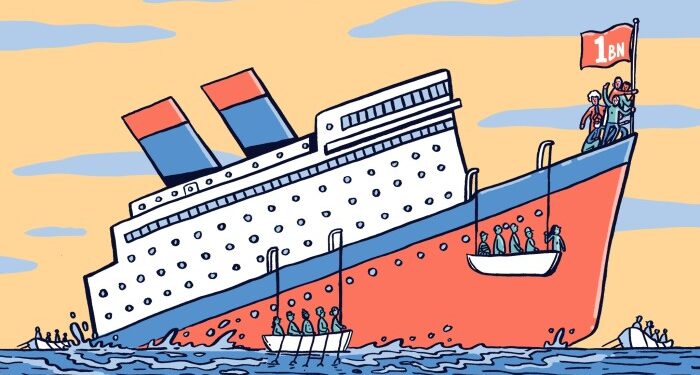Unlock the Editor’s Digest for free
Roula Khalaf, Editor of the FT, selects her favourite stories in this weekly newsletter.
Let’s play NumberWang! This is a game in which contestants throw arbitrary numbers around as if they meant something. It was an invention of the BBC TV comedy That Mitchell and Webb Look.
The sketch show is long gone. Real-world NumberWangers play on. The UK’s new government has been trying its hand since coming to power this summer. As the festive season approached, analysts joined in with predictions for market levels at the end of 2025.
When I worked on Lex, crying “that’s NumberWang!” was a way of denouncing the use of figures to justify a shaky thesis. The latter, widely-practised manoeuvre often depends on “anchoring”. This behavioural finance term describes our human tendency to moor our thinking on a subject to particular numbers.
Sometimes an anchor number is helpful. An example, cited by Ben Kumar, head of equity strategy at 7IM, is four hours. This is the motivational target which many amateur marathon runners seek to beat.
More often, anchor numbers are not in our best interests. Politicians and salespeople frequently seek to anchor our thinking to a fixed number. Their aim is to nudge us into agreeing to whatever suits them, via “priming”, a related wheeze. Here, the anchoring number softens us up to an unpopular policy or a steep purchase price.
Consider three examples from politics, the first two perpetrated this year:
Rachel Reeves’ £22bn “black hole”. The chancellor claimed this was the unexpected shortfall in public finances she found on assuming office. The chasm was a justification for steep tax increases.
Reeves provided no supporting calculations at first. When sums were finally published, they were unconvincing. Dodgy padding included £5.3bn in Labour increases to public sector pay that outgoing Tories were plainly not responsible for.
The Treasury’s “500 farms”. The new government wanted the public to believe it was only imposing inheritance tax on a small, wealthy minority of farm heirs. So it cherry-picked an annual figure from available data sets. This was correct by one narrow measure and wrong by several broader ones.
Boris Johnson’s “£350mn for the NHS”. The former prime minister often stretched the truth as vigorously as a medieval robber baron elongating a rival on a rack.
In the run-up to the 2016 Brexit vote, Johnson claimed the UK was “sending” £350mn a week to the EU. This gross figure ignored a rebate and subsidies. But it anchored public worries over EU membership costs more persuasively than a net figure of some £175mn.
Anchoring and priming are common strategies in finance too. In the mid-2010s, a flurry of mid-cap companies tested UK market interest in potential flotations by prompting press reports on the subject.
In off-record briefings, I was struck by how often float advisers cited “around £1bn” as the prospective valuation figure they wanted journalists to shove under the noses of investors. My own admittedly grudging valuations suggested “about £890mn” or “in the same postal code as £930mn” might be closer to the truth.
My informants were just following an age-old seller’s imperative: always anchor buyers’ expectations upwards. Once or twice I asked what peer group had suggested a valuation of “around £1bn”. Contacts would then cite a gogo crew including businesses listed in the US, land of the elevated earnings multiple.
These days, venture capitalists sometimes prep tech start-ups for a lucrative float by similar means. They buy fresh slivers of equity at higher prices than in previous financings. Such “uprounds” generate a steeper implied anchor valuation for the whole business, even if the percentage of equity sold is too small unequivocally to represent the whole.
As private investors, we tend to anchor our own thinking upwards. It is nicer to think about gains than losses. We are assisted by professional analysts. Most of them make a living, however indirectly, on investors buying and trading shares. People are more likely to do this if they believe stocks are a one-way winning bet.
This may help explain why only one forecaster from a group of 16 collated by Yahoo Finance expected the S&P 500 to end 2025 lower than 6,000, the level around which it was trading in mid-December. The commonest forecast was 6,500 by New Year 2026.
Such predictions can be dangerous. You might, for example, put off a planned withdrawal from your investments. Instead, you would wait patiently for the S&P to hit 6,500, as those nice people from Goldman Sachs said it should. This would not stop stocks from dropping again in the meanwhile.
Purchase prices are also bad anchors. They too may encourage us to hang on for gains that may not materialise. “The price you paid for a security is irrelevant after you have bought it,” says Guillaume Rambourg, a philanthropist and former hedge fund manager. “The only thing that matters from then on is where you think the price will go next.”
One reason that the UK government still owns a stake in lender NatWest is the desire of successive administrations to avoid selling way below the crisis-era in-price of around 500p. The foot dragging suggests ministers do not understand real versus nominal prices, opportunity costs or the difference between an investment and a bailout.
However, it is good to know that politicians can erroneously anchor their own thinking to an irrelevant figure, even as they try to pull the same trick on us.
Jonathan Guthrie is a writer, adviser and former head of Lex. jonathanbuchananguthrie@gmail.com





